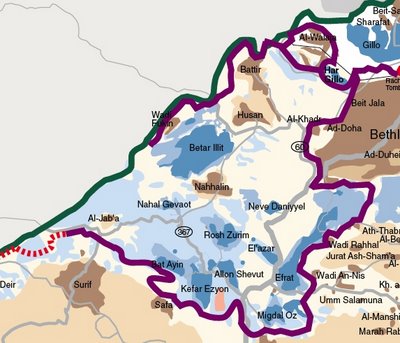Yusuf's Story, produced by WPKN's East End Long Island News Team and written by Hazel Kahan of Mattituck was broadcast on Thursday, November 16 at 12 Noon on WPKN 89.5 and WPKM 88.7.
The half-hour program is now available on the web at this link.
The Background:
Since 1967 Palestinians in the occupied West Bank have been surrounded by expanding Israeli settlements and a network of roads built solely for the occupiers.

Now Israel is building a barrier - part concrete wall - part steel fence and roadways - in the name of security - along and within the Palestine side of the ‘green line’, its border with the West Bank.
In this map of the Bethlehem area from B'Tselem the purple line is the planned route of the wall. The Palestinian villages are shaded brown and the Israeli settlements in blue. Israeli controlled areas are light blue and white.
In the areas of the West Bank surrounding Jerusalem Israel continues to build and expand settlements.
South of Jerusalem Israeli government plans call for several Palestinian villages to be trapped between two barriers - a wall close to the green line and another wall, several miles west, blocking access to Bethlehem and the rest of the West Bank.
One of the villages in the planned path of the wall is the ancient village of Battir, a few miles west of Bethlehem. (Battir is just east of the green line near the top of the map.)
Yusuf lives in Battir and has worked for many years in nearby Aminadav in Israel.
Yusuf's story was written and is narrated by Hazel Kahan. Hazel is an activist and artist who lives in Mattituck. She travels frequently to Israel to visit family and friends around Jerusalem.
Yusuf's Story was produced by WPKN's East End of Long Island News Team.
More Info:
Information on the wall and Israeli settlements on the West Bank, including maps, can be obtained from B’Tselem, the Israeli Information Center for Human Rights in the Occupied Territories.
More information about Battir can be obtained on the
web at the web site of the Applied Research Institute - Jerusalem at
www.arij.org/